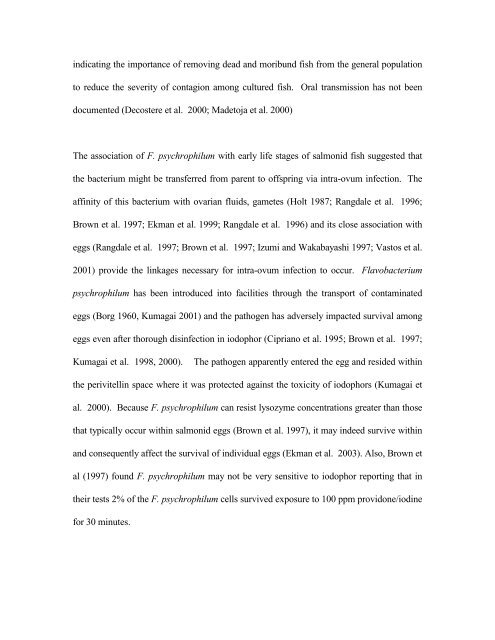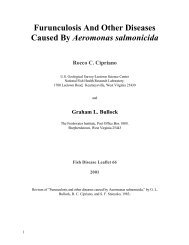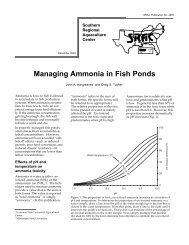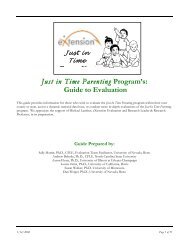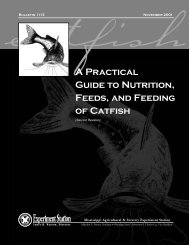Flavobacterium psychrophilum, cause of ... - cop.eXtension.org
Flavobacterium psychrophilum, cause of ... - cop.eXtension.org
Flavobacterium psychrophilum, cause of ... - cop.eXtension.org
You also want an ePaper? Increase the reach of your titles
YUMPU automatically turns print PDFs into web optimized ePapers that Google loves.
indicating the importance <strong>of</strong> removing dead and moribund fish from the general population<br />
to reduce the severity <strong>of</strong> contagion among cultured fish. Oral transmission has not been<br />
documented (Decostere et al. 2000; Madetoja et al. 2000)<br />
The association <strong>of</strong> F. <strong>psychrophilum</strong> with early life stages <strong>of</strong> salmonid fish suggested that<br />
the bacterium might be transferred from parent to <strong>of</strong>fspring via intra-ovum infection. The<br />
affinity <strong>of</strong> this bacterium with ovarian fluids, gametes (Holt 1987; Rangdale et al. 1996;<br />
Brown et al. 1997; Ekman et al. 1999; Rangdale et al. 1996) and its close association with<br />
eggs (Rangdale et al. 1997; Brown et al. 1997; Izumi and Wakabayashi 1997; Vastos et al.<br />
2001) provide the linkages necessary for intra-ovum infection to occur. <strong>Flavobacterium</strong><br />
<strong>psychrophilum</strong> has been introduced into facilities through the transport <strong>of</strong> contaminated<br />
eggs (B<strong>org</strong> 1960, Kumagai 2001) and the pathogen has adversely impacted survival among<br />
eggs even after thorough disinfection in iodophor (Cipriano et al. 1995; Brown et al. 1997;<br />
Kumagai et al. 1998, 2000). The pathogen apparently entered the egg and resided within<br />
the perivitellin space where it was protected against the toxicity <strong>of</strong> iodophors (Kumagai et<br />
al. 2000). Be<strong>cause</strong> F. <strong>psychrophilum</strong> can resist lysozyme concentrations greater than those<br />
that typically occur within salmonid eggs (Brown et al. 1997), it may indeed survive within<br />
and consequently affect the survival <strong>of</strong> individual eggs (Ekman et al. 2003). Also, Brown et<br />
al (1997) found F. <strong>psychrophilum</strong> may not be very sensitive to iodophor reporting that in<br />
their tests 2% <strong>of</strong> the F. <strong>psychrophilum</strong> cells survived exposure to 100 ppm providone/iodine<br />
for 30 minutes.


